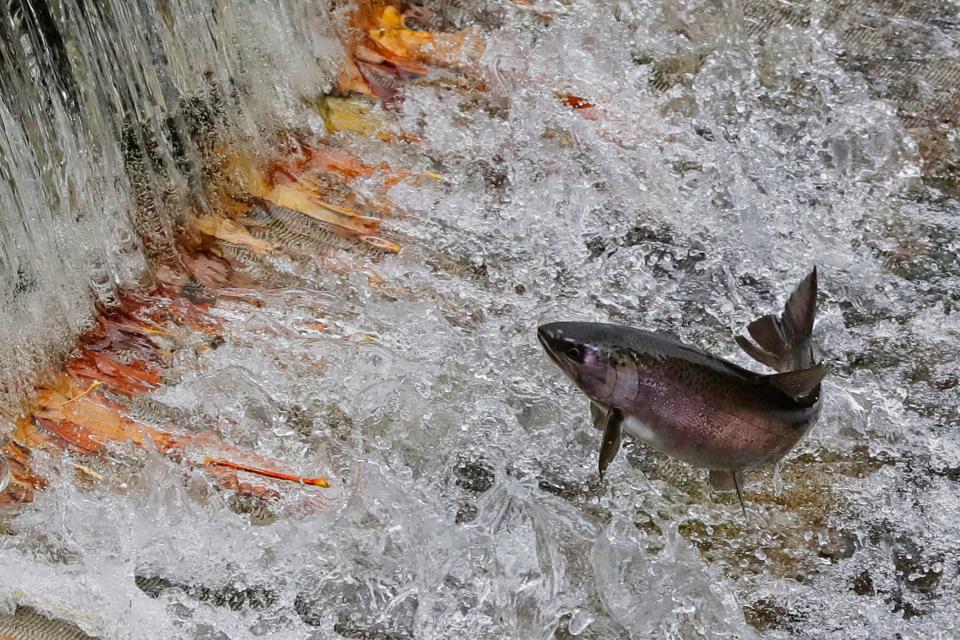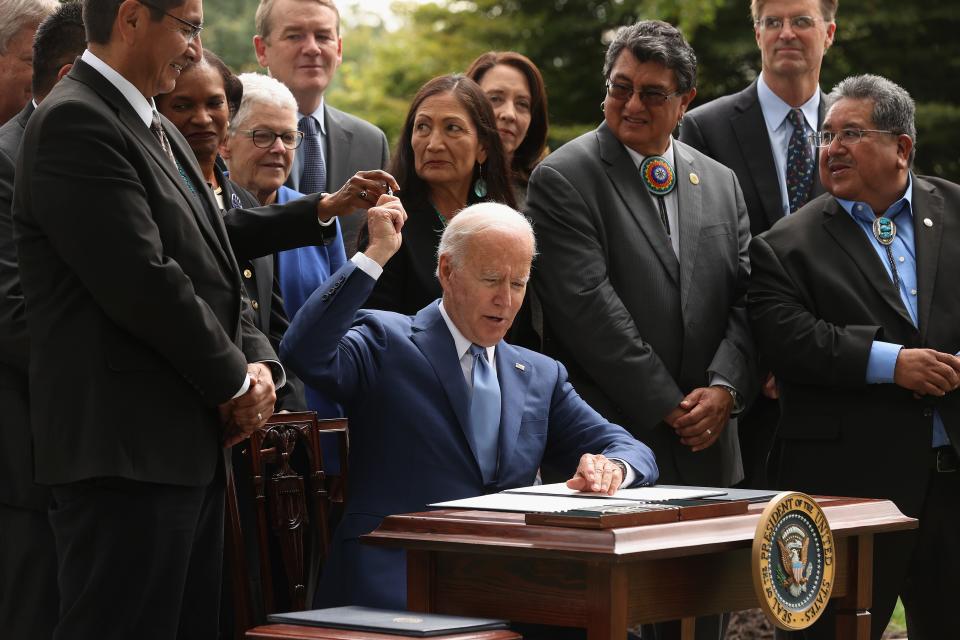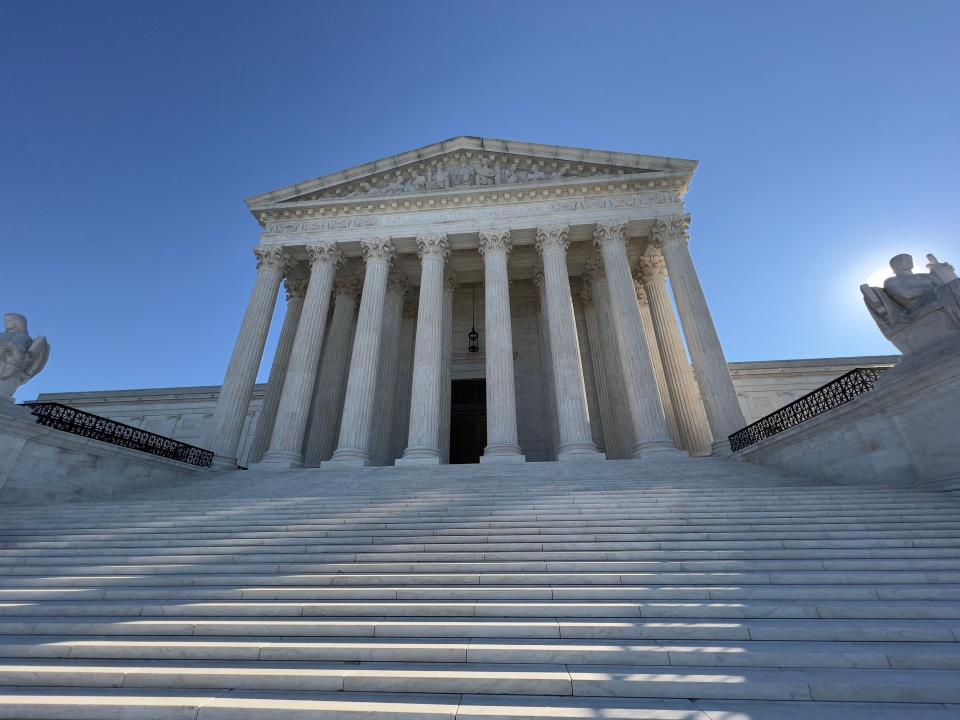Native Americans are winning at the Supreme Court – with help from Justice Gorsuch
WASHINGTON – Associate Justice Neil Gorsuch had been on the Supreme Court a little more than a year when he threw Native Americans a line in a century-old battle over fish.
In the 1850s, the tribes living in what would become Washington state gave up millions of acres of their land in exchange for the right to fish the salmon in the waters around Puget Sound. Culverts the state uses to direct streams under roads prevented salmon from spawning, reducing the species' population and threatening a way of life.
When the dispute reached the Supreme Court in 2018, Gorsuch shut down one of the state's arguments – that its transportation needs allowed it to renege on the promises made in treaties signed three decades before Washington became a state.
"The point of a treaty, I would have thought, would have been to freeze in time certain rights," Gorsuch said during oral argument. "To ensure their existence in perpetuity."
Nominated by President Donald Trump in 2017, Gorsuch, 54, has reliably sided with conservatives on religious freedom, gun rights, abortion and a host of other issues decided by the nation's highest court. But the Colorado native, a former judge on the Denver-based U.S. Court of Appeals for the 10th Circuit, has demonstrated a streak of independence when it comes to tribal law.
Guns: Can New Yorkers carry guns? A 700-year-old law may inform the answer
Thomas: Justice celebrates 30 years on a court moving in his direction
His swing-vote status on Native American issues has led to a number of victories for tribes on what Chief Justice John Marshall once described as the court "of the conqueror," a place critics said has often ridden roughshod over appeals filed by Indigenous people.
"He's an outlier compared to the other conservatives and compared to what you see at the circuit court level," said Greg Ablavsky, a professor at Stanford Law School.
Gorsuch joined the court's liberals and wrote for a 5-4 majority last year recognizing the eastern half of Oklahoma as Native American territory for purposes of criminal prosecutions. Some Oklahoma Republicans have called that ruling "profoundly flawed" and sued to ask the Supreme Court to overturn it.
More: Supreme Court says eastern Oklahoma remains Native American territory
Legal observers said Gorsuch's approach to Native American issues aligns with his embrace of textualism, the theory espoused by his predecessor, Associate Justice Antonin Scalia, that courts should decide interpretation questions based first on the text of a law – or a treaty. That means putting less emphasis on what a judge says the law's intent might have been.
It's an approach that often works out better for conservative positions. But not always.
In both the fishing rights case and the Oklahoma decision, one of Gorsuch's underlying assertions is that governments can't just wish away the rights granted to Native Americans. If Congress wants to alter those rights, it has to say so explicitly.
"If you're taking away power from a sovereign, you need to be very clear that's what you're doing," said Riyaz Kanji, who represented the Muscogee (Creek) Nation last year in the Oklahoma case.
"As a Westerner and somebody who prides himself on being a Westerner," Kanji said, "I think he just has a greater familiarity with tribes and tribal governments."

All of that could play an important role in two Native American cases the court agreed to decide and an appeal sitting just over the horizon in which the justices were asked to decide whether a 1978 law that gives Native Americans preference in the adoption of Native children is constitutional.
Almost 10 million people identified as at least partly American Indian or Alaska Native in the 2020 census.
The Supreme Court split evenly in the fishing dispute after Associate Justice Anthony Kennedy recused himself. That allowed a lower court's ruling in favor of the Native American interests to stand. State officials have until 2030 to replace or fix hundreds of culverts.
'An old and familiar story'
Gorsuch's approach to tribal law isn't a surprise to those who watched him on the 10th Circuit, which covers territories of 76 federally recognized tribes. He sided with tribes in 16 of 28 cases analyzed by the Native American Rights Fund.
On the Supreme Court, Gorsuch joined liberals in 2019 to prohibit Washington state from taxing fuel imports for the Yakama Nation in the same way that the state taxes other fuel imports carried on its highways. The 5-4 majority said the tribe's 1855 treaty, which granted the tribe a right to "travel on all public highways," preempted the state tax.
Washington officials argued the treaty guaranteed only a right to travel, not to travel tax-free. In a concurring opinion, Gorsuch wrote that members of the tribes at the time would have understood the treaty as granting a right to travel without restriction.
"Really, this case just tells an old and familiar story," Gorsuch wrote.
Washington got the land in exchange for "a handful of modest promises."
The state, he wrote, "is now dissatisfied with the consequences."
It was Gorsuch's opinion in the Oklahoma case last year that drew national headlines – and continues to prompt court battles.
Jimcy McGirt, a Native American, claimed his state rape conviction from 1997 should have been overturned because Oklahoma lacked jurisdiction. Congress, he said, never terminated the Muscogee reservation, an area that encompasses 3 million acres, portions of Tulsa and hundreds of thousands of non-Natives.
Gorsuch agreed, writing that if Congress wanted to change the reservation's boundaries it should have passed a law to do so.

"On the far end of the Trail of Tears was a promise. Forced to leave their ancestral lands in Georgia and Alabama, the Creek Nation received assurances that their new lands in the West would be secure forever," Gorsuch wrote.
Chief Justice John Roberts, in a dissenting opinion, said Congress made no attempt to conceal its intention to "disestablish" reservation lands.
“The court suggests that Congress sought to ‘tiptoe to the edge of disestablishment,’” Roberts wrote. “Quite the opposite. Through an open and concerted effort, Congress did what it set out to do: transform a reservation into a state.”
State courts interpreted the ruling to encompass a larger area, covering nearly 2 million Oklahomans. State officials said the decision has thrown Oklahoma's criminal justice system into chaos, and Republican Gov. Kevin Stitt described the ruling as the "most pressing issue for our state's future."
Others said Oklahoma overstates the impact, which is limited to certain kinds of crimes and depends on whether the suspect or victim is a tribal citizen. Although McGirt's state conviction was thrown out after the Supreme Court decision, he was charged and convicted by federal authorities and is serving a life sentence in Florida.
"There's an enormous amount of hype," said Lindsay Robertson, an expert on Native American law at the University of Oklahoma. "There's a narrative being spread by certain forces in the state about all the chaos that has resulted."
Jonodev Chaudhuri, the Muscogee ambassador to Washington, D.C., agreed.
"Anybody familiar with Justice Gorsuch's record in the lead-up to his appointment to the Supreme Court should have been encouraged by his textualist understanding of Indian law," Chaudhuri said. "Those of us who follow Indian law understand that a strict reading of the law without an outcome-determinative slant usually leads to a good outcome for tribal nations."

Native American adoptions
The high court agreed last month to hear two Native American cases.
One deals with whether the Ysleta del Sur Pueblo in Texas is prohibited from running bingo machines that a lower federal court said "look and sound like Las Vegas-style slot machines." The other involves a member of the Navajo Nation who was tried for the same crime in federal court and a separate, Native-specific court system created by the U.S. Bureau of Indian Affairs in the 19th century. The question for the high court is whether that constitutes double jeopardy.
Legal experts said those cases will probably have limited impact beyond the tribes involved. Some pay closer attention to a case that's likely to have broader implications for tribes if the court agrees early next year to hear it. That case involves several non-Native families who are challenging a 1978 law that gives Native Americans preference in the adoption of Native children.
The law was a response to long-standing practices that often resulted in the dismantling of Native families, including through the forced separation of children. In a deeply divided, 325-page ruling in April, an appeals court in New Orleans struck down portions of the law for violating the Constitution's prohibition on racial discrimination by the government. The court also split on whether the law unconstitutionally compels state agencies to enforce federal requirements.
The case was brought by non-Native families in Texas, Nevada and Minnesota who sought to adopt Native children but were challenged by Native relatives.
"That's where all of this is going to hit the fan, so to speak," said Matthew L.M. Fletcher, director of the Indigenous Law & Policy Center at Michigan State University and a member of the Grand Traverse Band of Ottawa and Chippewa Indians.
Associate Justice Amy Coney Barrett's confirmation last year adds a degree of uncertainty to the dynamic in the Native American cases, experts said. Though Barrett served as a federal appeals court judge in Chicago, she rarely had an opportunity to wade into tribal law matters.
Fletcher said a strictly textualist approach – the one often embraced by Gorsuch – should leave the high court siding with tribes in many cases that come before it.
"My hope is that they're truly textualist – they'll let the public policy go by the wayside," he said. "Indian law should really be decided by Congress in the first instance and negotiation with the tribes … rather than by Supreme Court dictate."
This article originally appeared on USA TODAY: Justice Gorsuch reshapes Supreme Court's approach to Native Americans

 money
money 